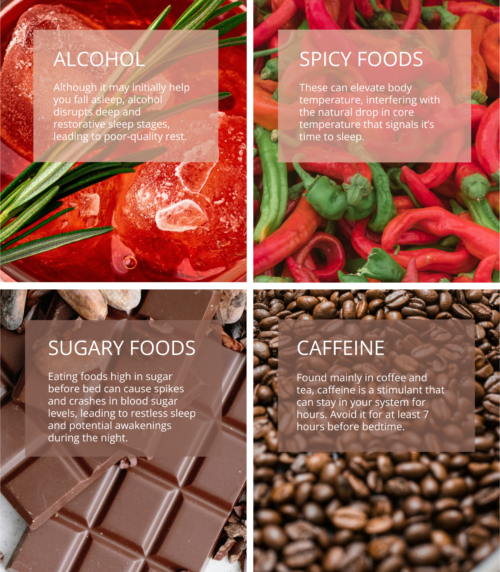How to Become Sleep Savvy

Sleep: A Cornerstone of Well-being
Have you ever wondered why some nights of good sleep leave you feeling refreshed and others still leave you drained? Sleep is much more than rest—it’s the foundation of our health, impacting both physical and mental well-being. It occurs in distinct phases: light sleep, deep sleep, and REM (rapid eye movement) sleep. Each phase plays a unique role: light sleep transitions you into rest, deep sleep focuses on physical restoration, and REM sleep sharpens memory and regulates emotions. Achieving high-quality sleep isn’t just about clocking eight hours; it often requires a combination of lifestyle adjustments, including diet, stress management, and physical exercise.
The Interplay Between Sleep and Nutrition
What you eat and drink significantly influences the quality of your sleep. Likewise, your sleep quality affects dietary choices, creating a two-way relationship. The food we consume provides the precursors necessary for neurotransmitter synthesis. In the morning, it is beneficial to support the production of acetylcholine and dopamine, which enhance cognitive functions such as memory, concentration, attention, and energy, helping us begin the day optimally. In the afternoon, it is advantageous to promote the synthesis of neurotransmitters like serotonin and gamma-aminobutyric acid (GABA), which are associated with relaxation and calming effects, ultimately contributing to better sleep quality.
How Poor Sleep Affects Hunger and Food Choices
When you’re sleep-deprived, you’re more likely to feel hungry and crave energy-dense, nutrient-poor foods. This is due to hormonal shifts: increased levels of ghrelin, the hunger hormone, and reduced levels of leptin, which signals fullness. The result? Overeating, particularly of foods high in sugar and fat, which can create a cycle of poor sleep and unhealthy eating habits.
Foods and Nutrients That Promote Sleep
To improve sleep quality, focus on foods that support relaxation and melatonin production. Recommended foods are those providing the precursors tryptophan and glutamic acid, which aid in synthesizing the neurotransmitters serotonin and GABA, respectively. Tryptophan-rich foods include spinach, sweet potatoes, kale, broccoli, prunes, kiwi, and mango, while glutamic acid can be found in tofu, all types of beans, grapefruit, and dried figs. Certain foods, such as eggs, are versatile and can stimulate the production of multiple neurotransmitters. You should also favor a vegan dinner (plant-based proteins such as legumes) to provide the body with high-quality nutrients that are highly anti-inflammatory and antioxidant. These nutrients support the body’s internal repair processes that occur during the night and stimulate the production of the neurotransmitter GABA, thereby promoting better sleep quality and quantity.

Foods and Beverages to Avoid
Certain foods and drinks can disrupt sleep if consumed late in the day:

Mind-Body Practices for Better Sleep
Meditation
Meditation is a powerful tool for improving sleep. Chronic stress often contributes to sleep difficulties, and meditation helps reduce stress by inducing deep relaxation. Regular practice can help you fall asleep faster and achieve more restful sleep.
Breathing Exercises
Simple breathing techniques can also help you fall asleep. Slow, deep breaths calm the nervous system and promote a sense of relaxation. Practices like the 4-7-8 method—inhaling for four seconds, holding for seven, and exhaling for eight—can be particularly effective.
Supplements to Support Restorative Sleep
What if the key to better sleep was encapsulated? For those seeking extra support, specific supplements offer a natural and effective way to enhance sleep by helping the body relax and regulate its sleep cycles. Holistic Health Balance Rest & Reset supports this process with key ingredients like L-tryptophan, which boosts serotonin to improve sleep, mood, and cognitive health, and lemon balm extract, known for promoting relaxation and mental clarity. These elements provide a holistic solution for better sleep, paving the way for a balanced and revitalized year ahead.
The Path to Better Sleep
Quality sleep is achievable through thoughtful changes to your daily habits. By choosing the right foods, engaging in regular physical activity, incorporating stress-reducing practices, and supporting your body with effective supplements, you can create the ideal conditions for restorative sleep—and wake up ready to embrace life to its fullest.
Want to unlock the secrets to a healthier and longer life?
Learn more about our range of advanced Holistic Health supplements